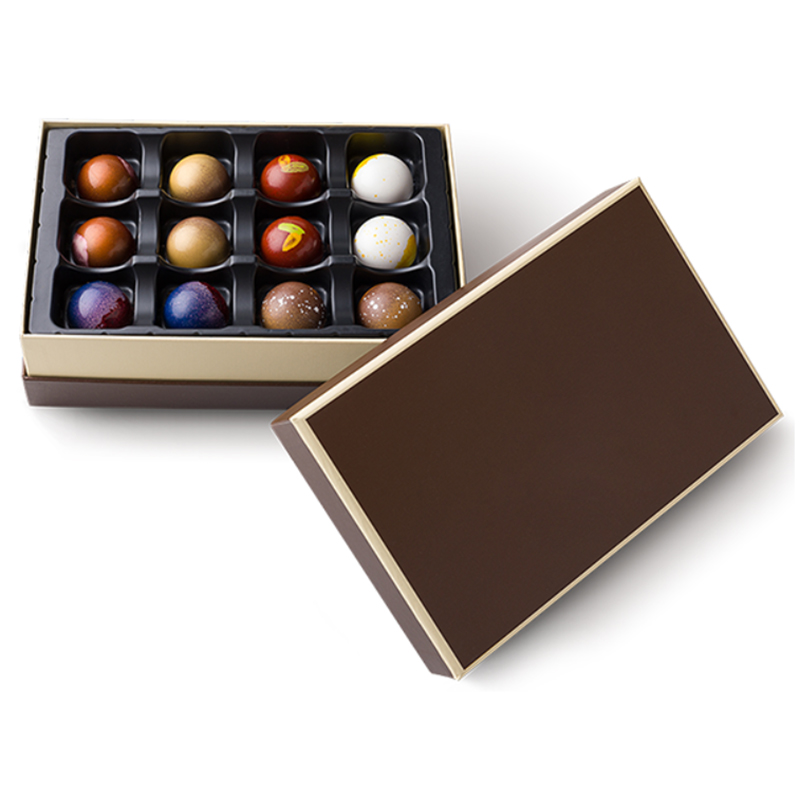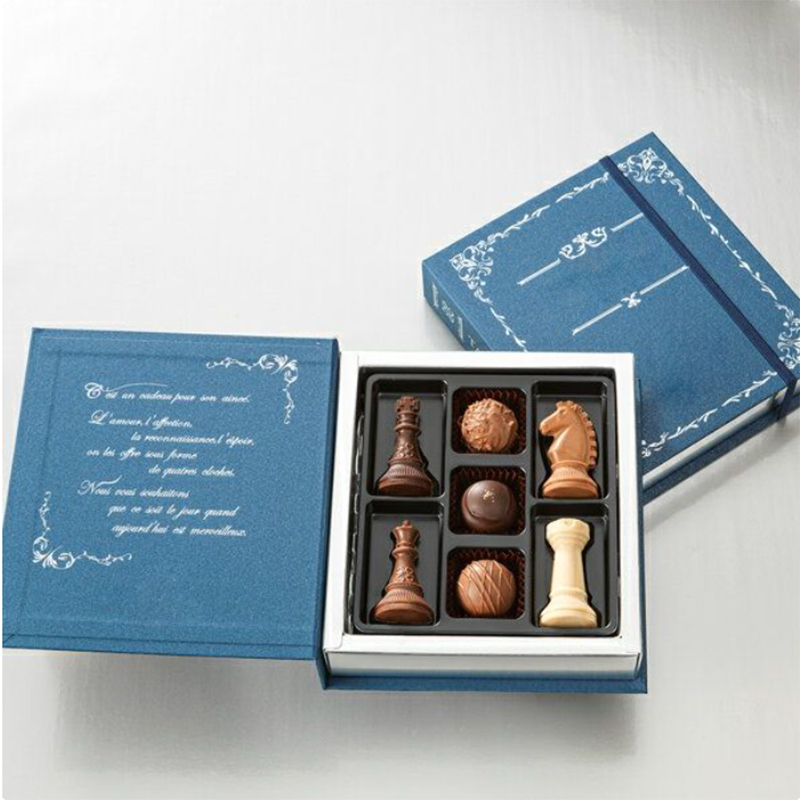- All
- Product Name
- Product Keyword
- Product Model
- Product Summary
- Product Description
- Multi Field Search
Views: 196 Author: XianDa Publish Time: 2025-02-19 Origin: Site

Content Menu
● How to Make Chocolate Box Cake Taste Like Bakery Cake
● Understanding Chocolate Box Cake Mixes
● The Chemistry Behind Box Cake
● Key Ingredients for Enhancement
● The Chocolate WASC (White Almond Sour Cream) Method – Enhanced
● Frosting Options: The Crowning Touch
● Chocolate Buttercream Frosting (Enhanced)
● Ganache Frosting (Luxurious and Decadent)
● Professional Baking Insights - Chocolate Box Factory
● Common Questions About Chocolate Box Cakes (Expanded)
Creating a chocolate cake that tastes like it came straight from a bakery can be a supremely satisfying endeavor. Many home bakers turn to boxed cake mixes for their convenience, but the key is knowing how to elevate these mixes beyond their humble beginnings. With a few carefully chosen adjustments and techniques, you can transform a standard chocolate box cake into a decadent treat that captures the rich flavors and textures of a professionally baked cake. This comprehensive guide will walk you through the process of transforming a simple chocolate box cake into an extraordinary dessert. We’ll explore key ingredients, essential techniques, and even discuss aspects of a "chocolate box factory" and the processes they employ to achieve consistent, mouthwatering results.
Boxed cake mixes are formulated with convenience in mind, often containing a precise balance of flour, sugar, leavening agents, emulsifiers, and preservatives. These ingredients ensure consistent results and ease of use. However, the simplicity and uniformity of these mixes can sometimes lead to a flavor profile that lacks depth and feels somewhat artificial compared to a bakery-style cake. To bridge this gap and replicate the taste of a freshly baked chocolate cake from a high-end bakery, we need to enhance the mix with strategic additions and baking techniques.
The beauty of a box cake lies in its chemical composition. The gluten in the flour, combined with liquids, develops the cake's structure. Leavening agents like baking powder create air bubbles, leading to a light and airy texture. Emulsifiers ensure that fats and liquids blend seamlessly, contributing to a moist crumb. However, these processes can be refined to achieve bakery-level quality.


Here are the game-changing ingredients that will elevate your chocolate box cake:
Sour Cream or Yogurt: Adding sour cream or plain yogurt increases moisture content and introduces a delightful tanginess that balances the sweetness of the chocolate. This results in a richer, more complex flavor profile and a wonderfully moist crumb. The acidity also tenderizes the gluten, leading to a softer cake.
Sour Cream and Yogurt
Substitution Note: If you don't have sour cream or yogurt, you can use buttermilk, crème fraîche, or even a vegan sour cream alternative.
Pudding Mix: Incorporating instant chocolate pudding mix adds significant moisture, density, and intensifies the chocolate flavor. The pudding mix also contains modified starch, which helps to bind moisture and creates a tender, almost melt-in-your-mouth texture.
Chocolate Pudding Mix
Flavor Variations: Experiment with different pudding flavors, such as dark chocolate or fudge, to customize your cake's flavor.
Extra Eggs: Using additional eggs, particularly egg yolks, enriches the cake batter and creates a more tender crumb and richer flavor. Egg yolks contain fats and lecithin, which act as natural emulsifiers, further enhancing the cake's texture.
Extra Eggs
Egg White Only Option: For a lighter texture, you can add extra egg whites.
Milk Instead of Water: Replacing water with whole milk (or even buttermilk) adds creaminess and depth to the flavor. The milk provides additional fat and protein, which contribute to a richer, more decadent taste.
Milk
Vegan Milk Options: Almond, soy, or oat milk can be used as a vegan alternative.
Vanilla Extract: A splash of pure vanilla extract (not imitation) enhances the overall flavor complexity and elevates the taste to a bakery-quality level. Vanilla extract complements the chocolate flavor and adds a touch of warmth and sophistication.
Vanilla Extract
Vanilla Bean Paste: For an even more intense vanilla flavor, consider using vanilla bean paste.
Coffee or Espresso Powder: A small amount of instant coffee or espresso powder intensifies the chocolate flavor without making the cake taste like coffee. This is a classic trick used by professional bakers to deepen and enrich chocolate desserts.
Espresso Powder
Dissolve in Hot Water: Dissolve the powder in a tablespoon of hot water before adding it to the batter for best results.
The Chocolate WASC (White Almond Sour Cream) recipe is a highly effective technique for improving boxed chocolate cakes. This method involves modifying the box mix with sour cream and other ingredients to create a cake that tastes remarkably homemade and has a superior texture.
1 box of chocolate cake mix (devil's food or dark chocolate recommended)
1 cup sour cream
1 cup whole milk
4 large eggs
½ cup vegetable oil (or melted unsalted butter for extra richness)
1 package (3.4 oz) instant chocolate pudding mix
1 teaspoon pure vanilla extract
½ teaspoon instant espresso powder (dissolved in 1 tablespoon hot water)
Preheat Your Oven: Set your oven to 325°F (165°C). Baking at a slightly lower temperature helps to prevent the cake from drying out.
Combine Wet Ingredients: In a large measuring cup, whisk together the sour cream, milk, eggs, oil (or melted butter), vanilla extract, and the dissolved espresso powder. Ensure everything is well combined.
Dry Ingredients: In a large mixing bowl, combine the chocolate cake mix and instant chocolate pudding mix. Whisk to break up any lumps.
Combine Wet and Dry: Gradually add the wet ingredients to the dry ingredients, mixing on low speed until just combined. Be careful not to overmix, as this can lead to a tough cake.
Prepare Cake Pans: Grease and flour two 9-inch round cake pans. For extra insurance against sticking, line the bottoms of the pans with parchment paper circles.
Pour Batter: Divide the batter evenly between the prepared pans. Use a kitchen scale for perfectly even layers.
Bake: Bake for 30-35 minutes, or until a toothpick inserted into the center comes out with moist crumbs. Avoid opening the oven door too frequently during baking to prevent temperature fluctuations.
Cooling Process: Allow the cakes to cool in the pans for 10 minutes before inverting them onto wire racks to cool completely.
The frosting is crucial for achieving a bakery-quality cake. Here are a couple of standout options:
Ingredients:
1 cup (2 sticks) unsalted butter, softened
4-5 cups powdered sugar
¾ cup unsweetened cocoa powder (high-quality Dutch-processed)
¼ cup heavy cream
1 teaspoon pure vanilla extract
Pinch of salt
Instructions:
Chocolate Buttercream Frosting
Beat the softened butter in a stand mixer (or with a hand mixer) until light and creamy.
Gradually add the powdered sugar and cocoa powder, alternating with small amounts of heavy cream.
Mix until smooth and fluffy. Add vanilla extract and salt.
If the frosting is too thick, add a bit more cream, one tablespoon at a time. If it's too thin, add more powdered sugar.
Ingredients:
12 oz high-quality semi-sweet or bittersweet chocolate, finely chopped
1 cup heavy cream
2 tablespoons unsalted butter (optional, for extra shine)
Instructions:
Ganache Frosting
Place the chopped chocolate in a heat-safe bowl.
Heat the heavy cream in a saucepan over medium heat until it just comes to a simmer. Do not boil.
Pour the hot cream over the chocolate and let it sit for 1-2 minutes to soften the chocolate.
Gently stir the mixture, starting from the center and working your way outwards, until the chocolate is completely melted and the ganache is smooth and glossy.
Stir in the butter (if using) until melted and incorporated.
Let the ganache cool slightly until it thickens to a spreadable consistency. This may take 30-60 minutes.
Pour over the cake for a beautiful, glossy finish or whisk it for a lighter, whipped ganache.
To enhance your comprehension, consider these visuals:
The scale of a “chocolate box factory” underscores the precision required in the mass production of cakes. Processes like automated mixing, temperature-controlled baking, and consistent frosting application all contribute to a uniform product.
For more detail, watch a video on industrial cake production for insights into efficient, large-scale baking: Industrial Cake Production.
Don't Overmix: Overmixing develops gluten, leading to a dense, tough cake.
Even Layers: Weigh batter for even layers and level cakes for stacking.
Cooling Time: Allow proper cooling to prevent crumbling during frosting.
Can I use any chocolate cake mix?
Answer: Yes, any chocolate cake mix can be enhanced with these methods.
What if I don’t have sour cream?
Answer: Substitute with plain yogurt, buttermilk, or crème fraîche.
How do I store leftover cake?
Answer: Store in an airtight container at room temperature for up to three days or refrigerate for longer freshness.
Can I freeze the cake?
Answer: Yes, tightly wrap in plastic wrap and aluminum foil before freezing.
What’s the best way to decorate my cake?
Answer: Fresh fruits, sprinkles, chocolate shavings, or edible flowers.
Can I adapt this recipe for cupcakes?
Answer: Yes, bake for 18-20 minutes.
How can I make this cake gluten-free?
Answer: Use a gluten-free chocolate cake mix and ensure all other ingredients are gluten-free.
Can I add chocolate chips to the batter?
Answer: Absolutely! Chocolate chips are a great addition.
What kind of oil is best for this recipe?
Answer: Vegetable oil or melted unsalted butter.
10.How can I prevent my cake from sticking to the pan?
Answer: Grease and flour or parchment paper lining.
By implementing these strategies, you can transform a humble chocolate box cake into a bakery-quality masterpiece.